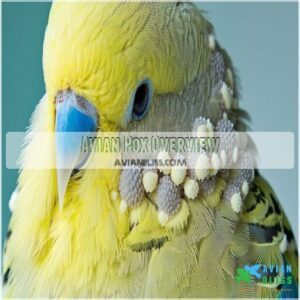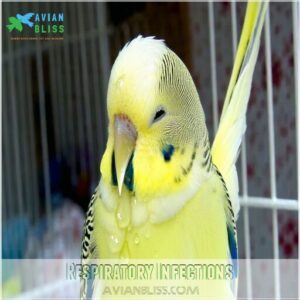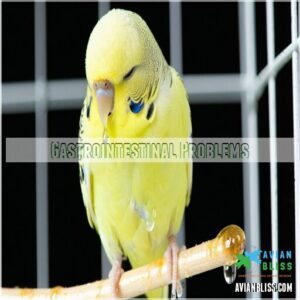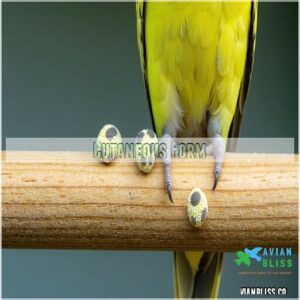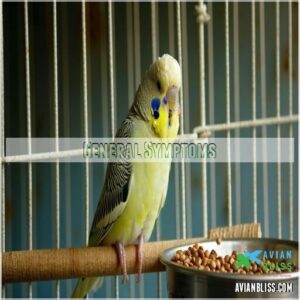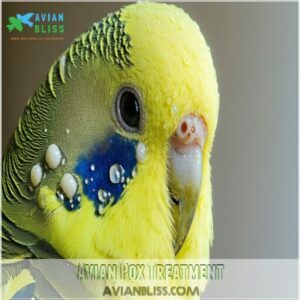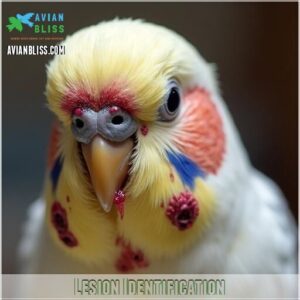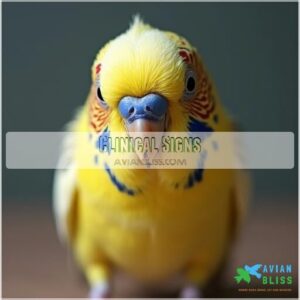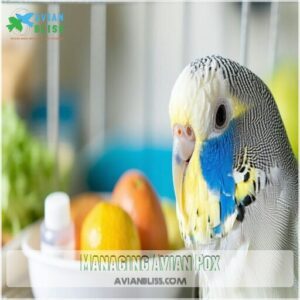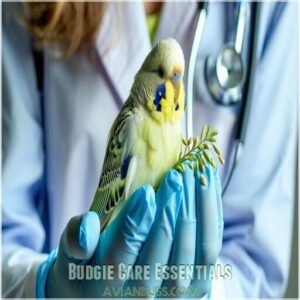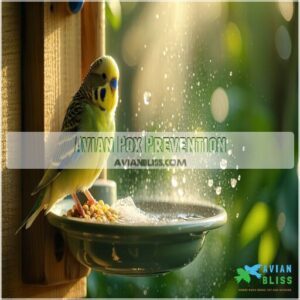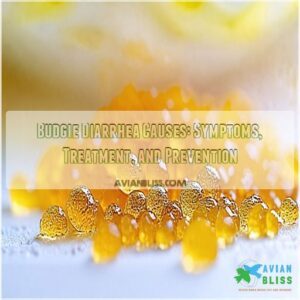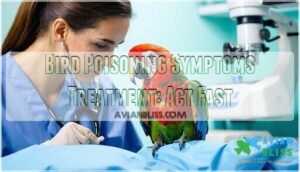This site is supported by our readers. We may earn a commission, at no cost to you, if you purchase through links.
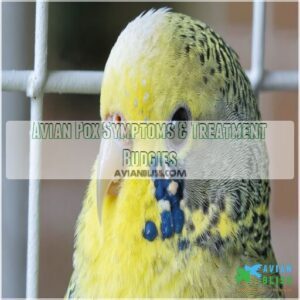
This disease is highly transmissible and can cause lesions, breathing difficulties, and loss of appetite.
While there’s no specific treatment, supportive care and preventing secondary infections are essential.
You’ll want to know how to recognize the symptoms and take steps to prevent the spread of avian pox in your flock.
Understanding the risks and taking proactive measures can make all the difference in keeping your budgies healthy – and that’s just the beginning of managing avian pox effectively.
Table Of Contents
- Key Takeaways
- Avian Pox Overview
- Budgie Health Issues
- Avian Pox Treatment
- Budgie Avian Pox
- Recognizing Avian Pox
- Managing Avian Pox
- Budgie Care Essentials
- Avian Pox Prevention
- Frequently Asked Questions (FAQs)
- How do you treat bird pox in birds?
- What is the prognosis for avian pox?
- Can avian pox spread to humans?
- Can fowl pox go away on its own?
- Can avian pox affect other pet birds?
- How long is recovery from avian pox?
- Are humans at risk from avian pox?
- Can avian pox be cured completely always?
- Does avian pox affect budgie behavior greatly?
- Conclusion
Key Takeaways
- You’ll want to recognize avian pox symptoms in your budgies, such as wart-like growths, breathing difficulties, and loss of appetite, to provide proper care and treatment.
- You can manage avian pox symptoms and prevent complications by providing supportive care, including fluid therapy, nutritional support, and wound management, and preventing secondary infections.
- You should take steps to prevent the spread of avian pox, such as controlling mosquitoes, quarantining new birds, and maintaining excellent hygiene practices, to keep your budgies healthy and safe.
- You’ll need to work with your avian vet to develop a treatment plan, which may include vaccination, antivirals, and topical treatments, to help your budgie recover from avian pox and prevent future outbreaks.
Avian Pox Overview
You’re likely reading this because you’re concerned about avian pox affecting your budgie, and you want to learn more about this viral disease.
As you learn about avian pox, you’ll discover it’s a highly contagious disease that can cause a range of symptoms in birds, including wart-like growths, respiratory issues, and other health problems.
What is Avian Pox
You’re dealing with avian pox, a viral infection causing wart-like growths in birds.
Avian pox in budgies is a concern. Avipoxvirus strains affect many species, including budgies, with dry and wet forms.
Understanding its causes is key to managing the disease and keeping your birds healthy and safe. Avian pox is one of many common bird diseases.
Avian Pox Symptoms
You’ll notice avian pox symptoms in budgies, such as wart-like growths, lesion appearance, breathing difficulty, eye/mouth discharge, and loss of appetite, indicating avian pox infection, characterized by budgie skin lesions and wartlike growths.
Avian pox affects over 200 bird species globally.
Avian Pox Transmission
Avian pox transmission occurs through several routes.
Mosquito vectors can spread the avian pox virus between birds.
Direct contact with infected wild birds also transmits avian pox in budgies.
Contaminated surfaces, like feeders, play a role.
Finally, ingestion or inhalation of the virus contributes to transmission.
- Imagine your feathered friend accidentally brushing against a contaminated perch.
- Picture a mosquito biting an infected bird, then your budgie.
- Think about your budgie pecking at a feeder visited by a sick bird.
- Envision your budgie inhaling dust particles carrying the virus, which can lead to avarian pox.
Budgie Health Issues
You’re likely concerned about your budgie’s health, and it’s necessary to recognize the signs of common issues.
As you care for your budgie, understanding respiratory infections, gastrointestinal problems, and feather issues can help you provide the best possible care and prevent diseases like avian pox.
Respiratory Infections
You’ll notice budgies with respiratory infections showing breathing difficulties, nasal discharge, and wheezing sounds, often accompanied by tail bobbing and puffed feathers.
These symptoms can be caused by bacteria or viruses, making it essential to address these budgie respiratory issues promptly.
To prevent further complications, it is crucial to act quickly when noticing these signs, as they can lead to more severe health issues in budgies, emphasizing the importance of recognizing respiratory infections.
Gastrointestinal Problems
You’re managing your budgie’s respiratory infections, now let’s tackle gastrointestinal problems.
Common issues include:
- Diarrhea
- Crop infections
- Vomiting
- Poor diet
- Weight loss, which can lead to candidiasis, a fungal infection causing regurgitation.
Feather Issues
You may notice feather problems in your budgie, such as feather plucking or abnormal growth, which can be caused by stress or French molt.
Leading to weak feathers and follicle damage, indicating potential health issues like feather picking, a common stress indicator in birds.
Cutaneous Form
The cutaneous form of budgie pox, also known as avian pox budgies, manifests as wart-like growths.
These budgie pox symptoms appear on featherless areas.
- Feet
- Legs
- Beak
- Around the eyes
- Vent
Lesion appearance varies, but the wartlike growths budgies develop are typically small, raised, and grayish-yellow.
This cutaneous form rarely causes serious health issues, but treating budgie pox is still essential.
Diphtheritic Form
You’ll notice budgies with the diphtheritic form of avian pox experiencing mouth and throat lesions, breathing difficulty, and wet pox symptoms, affecting their mucous membranes, making it hard for them to breathe, and causing budgie beak lesions, all characteristic of the diphtheritic form of this disease.
Avian pox occurs worldwide except for a few isolated regions, which is an important factor to consider when dealing with the avian pox disease.
General Symptoms
You’ll notice general symptoms of avian pox in budgies, including:
- Lethargy
- Appetite loss
- Ruffled feathers
- Difficulty breathing, with signs like eye/mouth discharge, indicating budgie pox treatment is needed to address avian pox symptoms.
The presence of these symptoms suggests that budgie pox treatment is necessary to alleviate the condition.
Avian Pox Treatment
You’ll focus on managing symptoms and preventing complications when treating avian pox in your budgie.
You can provide supportive care, prevent secondary infections, and consider vaccination to help your bird recover from this viral disease.
Supportive Care
You’ll provide supportive care, including fluid therapy, nutritional support, and wound management, to help your budgie recover from pox.
Consider avian pox support care products to aid in recovery.
Offer soft food and consider home remedies to reduce stress and relieve pain, focusing on overall supportive care for effective budgie pox treatment and recovery.
Preventing Secondary Infections
You’ll focus on preventing secondary infections during avian pox treatment.
Implement hygiene practices, wound management, and immune support. Quarantine measures and prophylactic antibiotics can help budgies recover.
Proper care prevents complications, reducing symptoms and promoting recovery from avian pox.
Vaccination
You’re now considering vaccination as a treatment step.
- Vaccine Types
- Dosage Schedule
- Administration
helps prevent avian pox in budgies, ensuring their safety and health with the right vaccine and treatment.
Budgie Avian Pox
You’re likely concerned about the health of your budgie, and avian pox is a significant threat to these birds.
As you learn about budgie avian pox, you’ll discover its symptoms, transmission, and treatment options to help keep your feathered friend safe and healthy.
Risk Factors
You face higher avian pox risk with crowding, mosquitoes, and stress.
Certain species, age, and budgies are more susceptible to transmission.
Understanding these risk factors is key to protecting your birds from avian pox, a highly contagious disease affecting many bird species, including budgies.
Prevention Methods
How can you protect your budgie from avian pox? Prioritize mosquito control around your home.
Essential bird pox prevention involves:
- Strict hygiene practices for feeders and waterers.
- Quarantine measures for new or sick birds.
- Following vaccination protocols.
- Minimizing stress in your budgie’s environment.
- Regularly cleaning birdfeeders to prevent avipoxviruses transmission by mosquitoes.
Smart habitat modification, discussed in this natural prevention guide, also plays a crucial role.
Treatment Options
You’ll use antivirals, topical treatments, and supportive care to treat avian pox.
| Method | Effectiveness | Safety |
|---|---|---|
| Antivirals | High | Medium |
| Topical | Medium | High |
| Supportive | Low | High |
Prevent secondary infections, boost immunity. Effective avian pox antiviral treatments are essential for recovery.
Recognizing Avian Pox
You’ll need to recognize the symptoms of avian pox in your budgie to provide proper care.
By identifying lesions, clinical signs, and using laboratory tests, you can determine if your bird has contracted this viral disease.
Lesion Identification
Identifying avian pox lesions in budgies involves looking for wart-like growths on featherless areas.
Lesions are often red or gray, developing slowly, and can crust or bleed.
Their location and color/texture help differentiate them from other symptoms, aiding in accurate diagnosis and timely treatment of avian pox.
Clinical Signs
You’ll notice breathing difficulty, mouth lesions, and wart-like growths in budgies with avian pox.
Swollen eyelids, scabs, and difficulty breathing are common clinical signs.
Lesions on the beak, legs, and vent area are also typical, affecting the feather condition and overall health of your budgie.
Laboratory Tests
You’ll need laboratory tests, such as virus isolation, PCR testing, or microscopic examination, to confirm avian pox diagnosis.
Identifying Bollinger bodies, and guiding effective treatment, ensuring accurate diagnosis beyond clinical signs, is crucial for effective treatment.
Managing Avian Pox
You’ll need to take a proactive approach to manage avian pox in your budgie, focusing on controlling outbreaks and preventing the spread of the disease.
By understanding the best methods for disinfection, quarantine, and care, you can help your bird recover and reduce the risk of transmission to other birds, which is crucial for overall avian health.
Controlling Outbreaks
To control avian pox outbreaks in budgies, isolate infected birds, reduce crowding, and implement quarantine procedures.
Disinfecting equipment and mosquito control are key.
This helps prevent the spread of avian pox, ensuring effective treatment and prevention for your budgies.
Disinfection Methods
To prevent avian pox, you’ll focus on cage disinfection, waterer sanitation, and feeder cleaning, using bleach solutions to kill the virus.
Keeping your budgies safe from infection and promoting a healthy environment for prevention and treatment is crucial.
Consider natural prevention methods to further protect your birds and ensure their well-being through natural methods.
Quarantine Procedures
When disinfecting, remember to isolate infected birds and separate new ones.
Disinfect equipment, monitor bird health, and quarantine for the recommended duration to prevent avian pox spread among budgies.
Ensuring effective treatment and prevention of this contagious disease.
Budgie Care Essentials
You play an essential role in keeping your budgie healthy by providing proper care and attention to their needs.
By focusing on nutrition, hydration, and maintaining a clean environment, you can help prevent the spread of avian pox and other diseases in your budgie, which is crucial for their overall health.
Nutrition and Hydration
You manage your budgie’s health by focusing on hydration needs and nutritional support, including Vitamin A, electrolyte balance, and probiotics, to prevent nutritional deficiencies.
With a balanced diet of pellets, fresh vegetables, and fruits, you can ensure your budgie is receiving the necessary nutrients.
Consider supplementing with budgie hydration gel products for additional nutritional support to keep your budgie healthy, emphasizing the importance of overall health management.
Clean Environment
To keep your budgie healthy, maintain a clean environment.
A balanced parakeet diet is also important.
Here are key tasks:
- Clean the cage
- Sanitize feeders
- Maintain water purity, focusing on cage hygiene and air quality to prevent contaminated and disease transmission.
Regular Check-ups
You’ll want to schedule regular vet checkups for your budgies, including weight monitoring, beak examination, and feather assessment, to catch avian pox symptoms early.
Ensuring timely treatment and preventing complications, with dropping analysis and vet consultations playing a key role in maintaining their overall health.
Avian Pox Prevention
Preventing avian pox in your budgies starts with understanding how it spreads.
Mosquito control is important, so eliminate standing water. Quarantine new birds to observe for any signs of illness before introducing them to your flock. Finally, maintain excellent hygiene practices.
- Follow vaccination protocols recommended by your avian vet. A vaccine can substantially reduce the risk, especially considering species susceptibility.
- Minimize stress for your budgies, as stress can weaken their immune systems.
- Regularly disinfect surfaces, especially feeders and waterers, to prevent the spread of the virus. These prevention tips can help keep your budgies healthy and happy.
Frequently Asked Questions (FAQs)
How do you treat bird pox in birds?
You’ll treat bird pox with supportive care, focusing on managing symptoms, preventing secondary infections, and promoting recovery with antibiotics, vitamins, and a clean environment.
What is the prognosis for avian pox?
You’ll be relieved to know that with proper care, most birds recover from avian pox, although it can be a long and challenging process, requiring patience and dedication.
Can avian pox spread to humans?
Fortunately, you’re unlikely to catch avian pox, as it rarely spreads to humans, posing little risk to your health.
Can fowl pox go away on its own?
You’ll be relieved to know that, yes, fowl pox can go away on its own with supportive care, but it’s essential to manage symptoms and prevent complications to guarantee recovery.
Can avian pox affect other pet birds?
You’ll find that avian pox affects over 200 bird species, so it’s likely your pet bird can get it, especially if they’re exposed to infected birds or contaminated environments somehow.
How long is recovery from avian pox?
You’ll be glad to know recovery from avian pox typically takes several weeks to a few months with proper care and management of symptoms.
Are humans at risk from avian pox?
You’re unlikely to catch avian pox, as it’s a bird-specific virus, but you can transmit it between birds through contact with infected droppings or contaminated surfaces.
Can avian pox be cured completely always?
You can’t always cure avian pox completely, but supportive care and management can help alleviate symptoms and prevent complications, and vaccination provides permanent immunity against the disease.
Does avian pox affect budgie behavior greatly?
You’ll notice changes in your budgie’s behavior, such as lethargy, loss of appetite, and respiratory issues, if they contract avian pox.
This condition can substantially impact their overall health and well-being suddenly.
Conclusion
Now you’re better equipped to handle avian pox symptoms and treatment for your budgies.
You’ll proactively manage avian pox symptoms and treatment by recognizing signs, providing supportive care, and preventing secondary infections.
Ultimately, keeping your budgies healthy and thriving with proper avian pox symptoms treatment budgies care.
- https://cwhl.vet.cornell.edu/disease/avian-pox
- https://www.michigan.gov/dnr/managing-resources/wildlife/wildlife-disease/wdm/avian-pox
- https://www.pelicanharbor.org/blog/avian-pox-transmission-and-treatment-in-wildlife-rehabilitation
- https://www.gardenwildlifehealth.org/portfolio/avian-pox-in-garden-birds/
- https://www.petplace.com/article/birds/general/10-most-common-budgie-diseases

